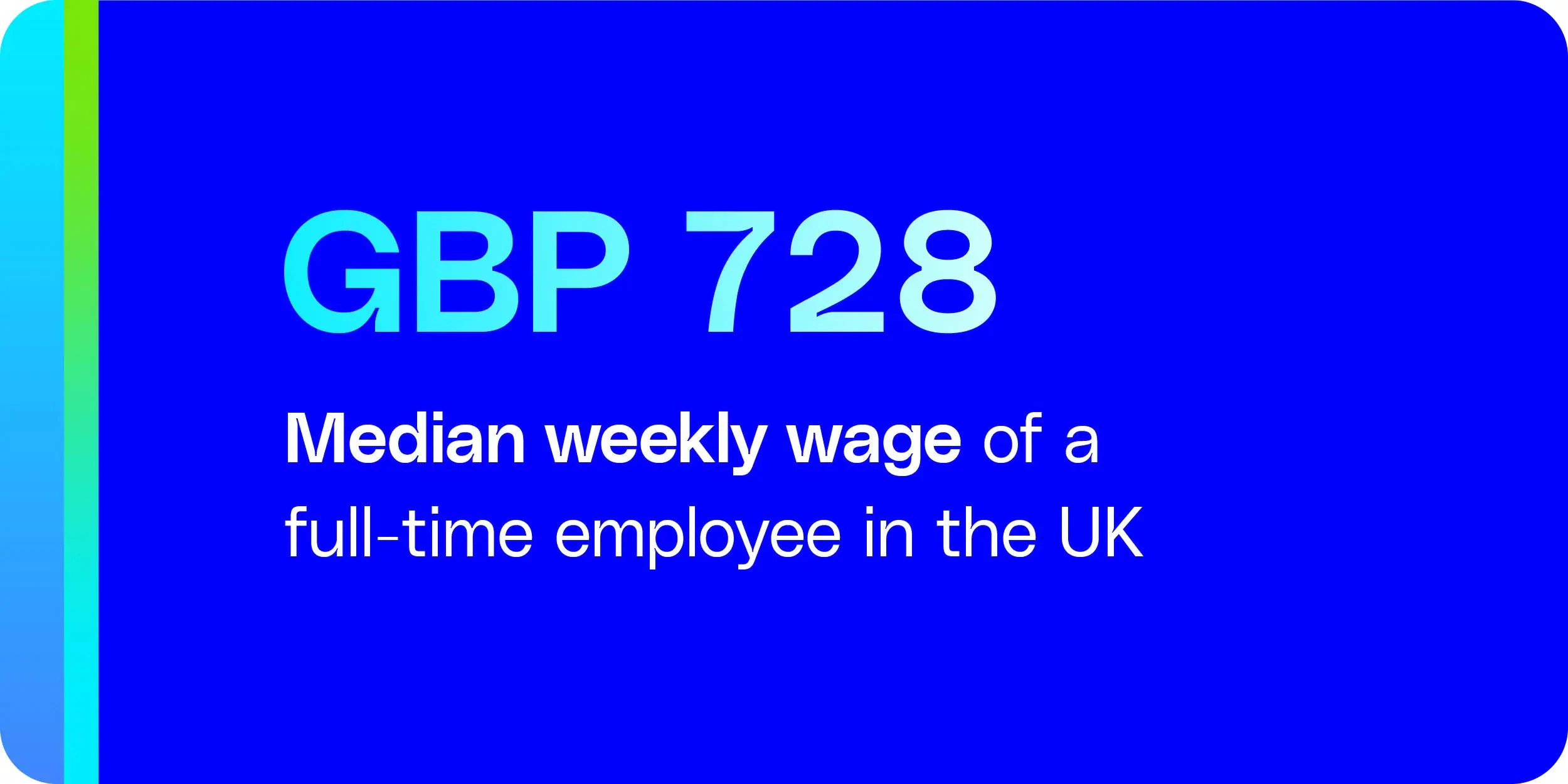The United Kingdom has a rich talent pool to share with the world. But the country also has complex labor and employment laws that are tricky to navigate.
For companies hiring UK employees, managing these regulations is complex but necessary. This guide will walk you through everything you need to know about hiring employees in the UK.
What to know before hiring in the UK
If you want to hire United Kingdom employees, start with these 10 compliance basics.
1. Minimum wages
The UK has two wage levels:
-
The national minimum wage: This is the minimum hourly wage for UK employees aged 20 or younger. In 2025, rates range from GBP 7.55 to GBP 10, depending on the employee's age and whether they're an apprentice. Rates change every year on April 1.
The national living wage: This is a higher rate, applicable to employees aged 21 and above. The 2025 rate is GBP 12.21 per hour. Rates are also updated every year on April 1.
2. Work hour regulations
A 40-hour workweek is typical in the UK. Employers can require employees to work longer hours, as long as their average pay for the total hours worked doesn't fall below the national minimum wage. Additionally, employees can't average more than 48 hours of work per week. This 48-hour limit doesn't apply to certain jobs, such as those where 24-hour staffing is needed.
Employees aged 18 and older may exceed 48 hours per week if they agree to do so in writing, and they can withdraw this commitment with at least a week's notice. Many employers offer overtime pay when employees exceed 40 hours a week or work on public holidays, but it's not mandatory to offer it at a premium rate. If you choose to offer overtime pay at a premium rate, include this information in your employment contracts.
3. Annual leave
Employees in the UK are entitled to at least 5.6 weeks (28 days) of paid annual leave. Employers decide whether to include the UK's 8-10 public and bank holidays (depending on jurisdiction) in the 28 days of paid annual leave. Part-time workers will have their 28 days' statutory annual leave prorated. For example, someone working 3 days a week will get 16.8 days off a year (3 days multiplied by 5.6 weeks is 16.8 days).
The ability to carry over leave depends on the type of leave and terms provided in the employee's contract. For example, if an employee was on statutory leave like paternity, maternity, adoption, or sick leave, they may carry over unused statutory holiday leave into the next year.
4. Family leave
Pregnant employees may take up to 52 weeks of maternity leave. Paternity leave is 1-2 weeks. Those adopting or pursuing surrogacy may take up to 52 weeks of adoption leave . Eligible parents may end their maternity leave early, and share the remaining leave and pay with their partner.
5. Healthcare

The UK government provides residents with health insurance via the National Health Service. You can offer additional private insurance, including vision and dental benefits, but this isn't compulsory.
6. Statutory Sick Pay (SSP)
Employees earning at least GBP 125 per week are eligible for SSP if they've been sick for more than three days in a row. Employees must document their illness with a doctor's note or other evidence. For most employees, SSP is available at a flat rate of GBP 118.75 per week for up to 28 weeks. Check for annual updates to the SSP flat rate and eligibility.
7. Pay-as-you-earn (PAYE) system
Under the PAYE system, employers must withhold income tax and National Insurance contributions (NICs) from employee wages. Employers remit these to HM Revenue and Customs (HMRC). The rates depend on the employee's earnings.
8. Pensions
Employers must offer a pension scheme to UK employees aged 22-66 who earn GBP 10,000 or more annually . However, employees can opt out. The pension scheme is jointly funded by the employer and employee at minimum contribution rates of 3% for employers and 5% for employees. Employee pension contributions are deducted before calculating tax on their remaining salary.
9. Visas
Immigration rules change often, so it's crucial that your team members have the right to work in the UK. Under the EU Settlement Scheme, EU, EEA, and Swiss citizens can continue living, working, and studying in the UK following Brexit. Non-EU citizens need a work visa , such as a Skilled Worker visa or an Intra-Company Transfer visa.
10. The Employment Rights Bill
The Employment Rights Bill will likely become law in 2025. This bill contains amendments to further protect United Kingdom employees. These amendments will place new compliance requirements on employers, including:
-
Eliminating the two-year service requirement for unfair dismissal claims
-
Consulting with employees and demonstrating reasonable cause when changing employment terms
-
Providing transparent, justifiable reasons for denying flexible work requests
-
Establishing clear policies for granting statutory bereavement leave
Top hiring hubs in the UK
Some UK cities are known for particular industries. Knowing what each city has to offer can help you channel your hiring efforts to the right place and fill roles faster.
The top talent hubs in the UK include:
London is the UK's capital and largest city, and a global hub for finance, technology, retail, fashion, and pharmaceuticals. It's a leading financial exporter, attracting top talent in banking, insurance, and asset management.
Manchester is a major industrial hub in Northwest England. This city is a global leader in advanced manufacturing, including the aerospace and automotive sectors. It has a growing tech scene with strengths in digital media, e-commerce, and cybersecurity.
Birmingham has a diverse economy and houses business, professional, and financial services. The automotive and rail manufacturing industries also thrive in Birmingham.
Cambridge has a strong research and development ecosystem, driven by the University of Cambridge. The science and technology hub in and around Cambridge is nicknamed Silicon Fen for its cutting-edge software, electronics, and biotechnology industries.
Edinburgh is Scotland's capital and the UK's second-largest financial center after London. This city is a global leader in banking, insurance, and investment management, and has a growing software industry.
Belfast attracts specialized talent in fintech and cybersecurity investment. Creative industries such as film and television also thrive here.
Cardiff, the Welsh capital, has diverse strengths in finance, media, tourism, film, and fintech.
Key industries in the UK
Understanding the UK's main industries helps you benchmark salaries and benefits. You can use this insight to make smart choices about where to invest and grow your workforce. The main industries in the UK include:
Finance and insurance: The UK's financial and insurance services sector contributed GBP 208.2 billion to the economy in 2023, accounting for 8.8% of total economic output. Prominent names in this sector include Barclays and Lloyds Banking Group.
Technology: In 2023, the digital and technology sector contributed 7% of UK employment . The UK is home to semiconductor designer Arm, fintech leader Revolut, and software giant Sage Group.
Healthcare and life sciences: These UK sectors employ hundreds of thousands of people and include well-known pharmaceutical companies such as AstraZeneca.
Creative industries: From July 2023 to June 2024, the creative industry accounted for about 7% of UK jobs . Big names include the BBC, the global advertising and PR firm WPP, and Pinewood Studios.
Manufacturing: The manufacturing sector contributed around GBP 217 billion in gross value to the UK economy in 2024. Notable UK manufacturing brands include Rolls-Royce, Unilever, and BAE Systems.
UK hiring expenses

Salaries and benefits vary by occupation, but the median weekly wage of a full-time employee in the UK is around GBP 728. Hiring in the United Kingdom requires careful budgeting:
-
Research: Complying with laws and regulations requires extensive research, so you'll have to pay employees to do this or partner with external compliance experts.
-
Entity formation: You need a subsidiary or branch to hire in the UK, which can be costly and time-consuming. Or, you can partner with an Employer of Record (EOR) and skip this requirement.
-
Hiring solutions: EORs streamline UK employment. Include their fees in your hiring budget.
-
Advertising: Posting job ads on popular UK job boards can help attract qualified applicants. Some of these platforms may charge a fee.
-
Legal checks: Verifying an applicant's right to work and other background checks take time and money.
-
Hiring committee: If you use an internal hiring committee, you'll pay for the working hours they spend writing the job ad, evaluating applications, and interviewing candidates.
-
Training: New hires require a training investment before they can start producing valuable work for your company.
The cost of hiring a contractor in the UK
Hiring full-time employees is great for long-term needs and core business functions. Contractors can be more cost-effective for short-term projects or when you need specialized skills for a limited time. Contractors typically have a higher hourly rate than employees, but allow you to save on several expenses, including training, NICs, pensions, holidays, SSP, and other benefits.
A contractor solution such as G-P Contractor™ can help you hire and pay contractors in the UK with ease.
What it takes to hire employees in the UK
To hire UK workers, you must have:
A legal entity:You need a registered subsidiary or branch to hire in the UK.
Employers' liability insurance: UK law mandates that companies have employers' liability insurance to protect employees in case of work-related sickness or injury.
Employer registration: Hiring UK employees requires registering as an employer with HMRC to manage tax obligations and withholdings.
Payroll: A compliant payroll system is crucial to calculate and remit taxes, NICs, and other deductions.
Partnering with an EOR streamlines all aspects of UK hiring. As a global EOR, we have entities worldwide. Instead of spending months setting up your own, you can use our EOR's UK subsidiary to hire employees in minutes.














